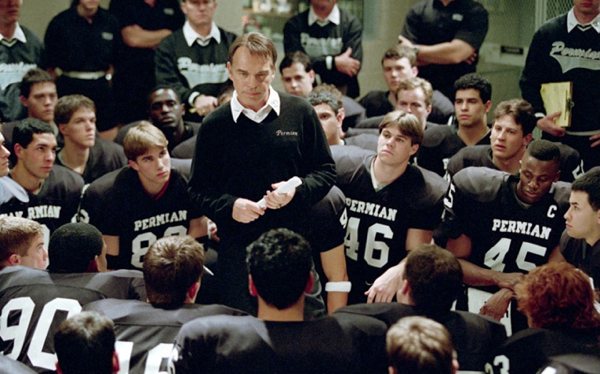Movie review by Greg Carlson
It was too much to hope that somehow, “Friday Night Lights” would be significantly different from other high school sports movies, because in that final quarter, just like clockwork, it all comes down to one play. Sure, the movie squirms around with some of the difficult realities of the football-equals-everything logic that nearly destroys the young men of desolate West Texas towns, but when you peel back the top layer, everything looks awfully familiar. Does a star athlete get injured? Yup. Does the coach deliver a rousing locker room speech? Check. Does the team forge an emotional bond that transcends the boundaries of typical adolescent relationships? Maybe.
Based on H.G. Bissinger’s noteworthy book, “Friday Night Lights” tries really hard to question the value system that places unyielding pressure on students to perform like seasoned pros. The movie is directed by actor Peter Berg, and stars Billy Bob Thornton – in another excellent performance – as coach Gary Gaines. Thornton is a marvelous performer, and his offbeat choices are always infused with a sublime sense of authenticity. Gaines may be quick to cut loose with amusing outbursts of “my goodness gracious” when a player does something foolish, but underneath, he has the instincts needed to cope with a town where the team-makers will have your job if you fail to deliver a state championship.
The players are quickly sketched, and only a few manage enough screen time to develop identifiable personalities. Lucas Black plays quarterback Mike Winchell, a morose downer who takes care of his ailing mother even as he dreams about escaping Odessa, Texas for a better life. Winchell doesn’t seem to care about football all that much, and that alone distinguishes him from most of the other characters. Boobie Miles (Derek Luke) is the cocky, talented running back who has already started to pick out the expensive cars that will be his once he joins the NFL. Don Billingsley (Garrett Hedlund) tiptoes around his abusive father (a quite good Tim McGraw), a former state football champ whose alcoholism poses a real threat to his son.
“Friday Night Lights” is more serious-minded than “Varsity Blues,” but both movies cover a lot of the same turf. Like the book upon which it is based, “Friday Night Lights” covers the ups and downs of the Permian High School Panthers during the course of the 1988 season (love the mileage Berg gets out of acid-washed jeans and Boobie’s Public Enemy jacket), but the film could really be set in any year. Gridiron crunches are the main draw, and as a result, female characters are left underdeveloped at best, totally ignored at worst. The townspeople who delight in hassling Gaines are depicted as drooling rednecks; the best line is overheard on a radio call in show when an angry fan moans that maybe too much learning and not enough football is going on at the school.
The film would have been more interesting if its skepticism had been allowed a stronger voice. With sports movies, though, you cannot bite the hand that feeds. Football, therefore, is center stage and Berg depicts the action on the field with color and intensity. Fans of the game will likely ignore any of the uglier side-effects that small town football brings out in its acolytes – the game footage is much too dynamic to let that happen. “Friday Night Lights” does quite well, however, with the details and the moments. For the audience members who are not sports fans, the movie has enough criticism to affirm the underlying assertion that high school athletes are disposable. Seniors inevitably graduate, and there is always hope for next year’s team.
